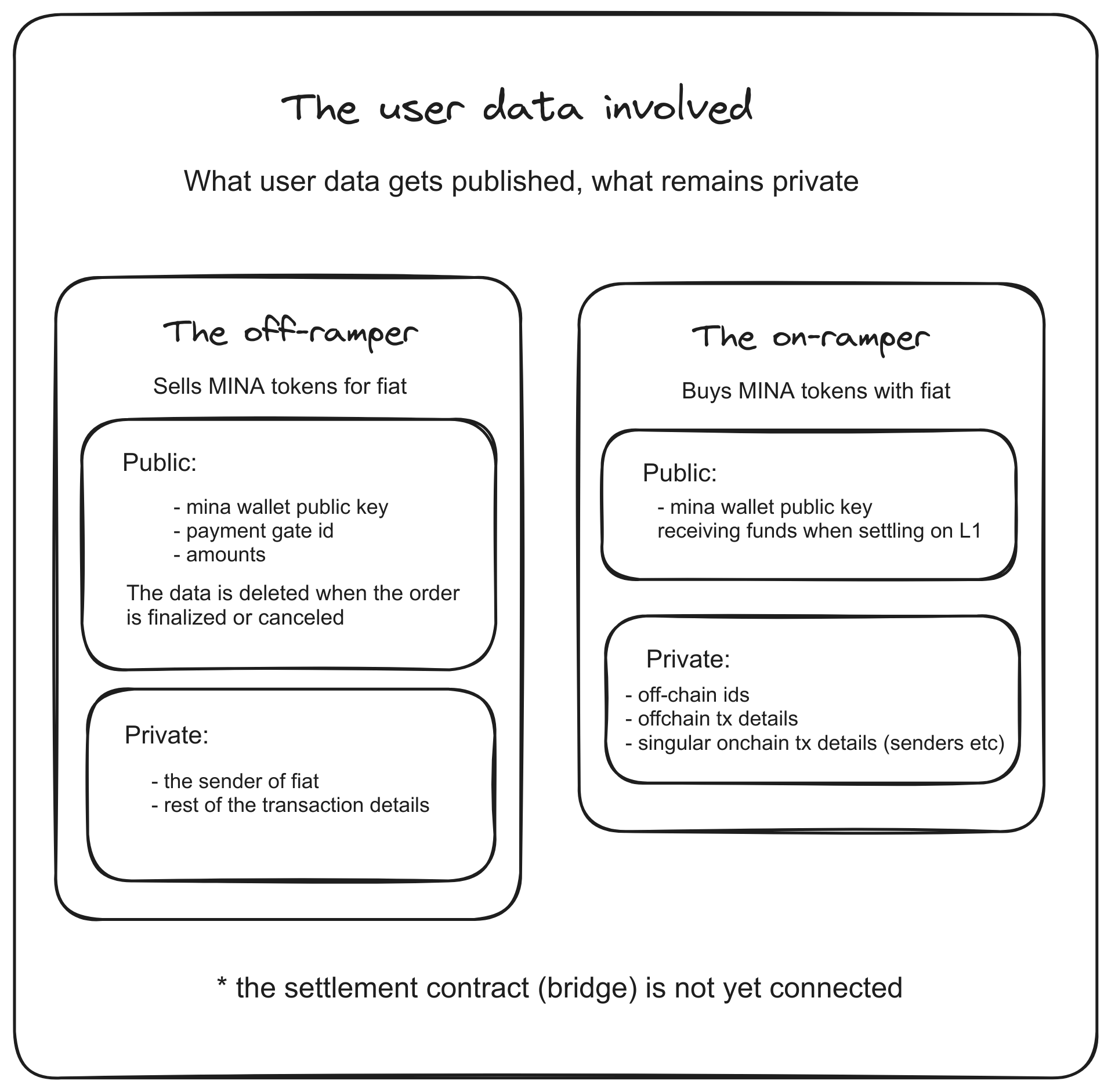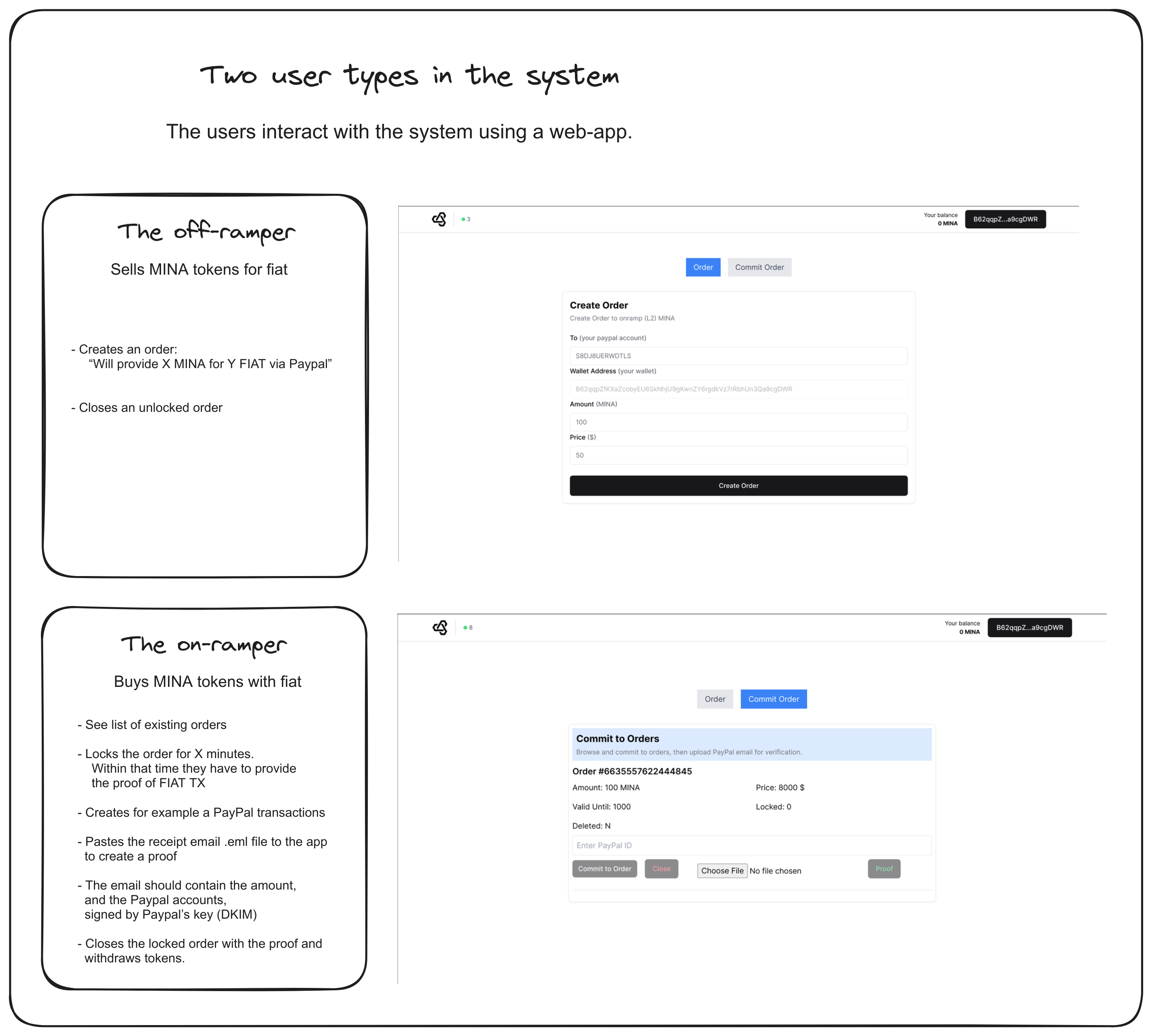This repository contains a proof-of-concept of a fiat(USD)-MINA bridge that aims to be off-chain identity-hiding (the on-ramper) and decentralized.
It was created during the ZK Hack Krakow (2024) hackathon for the "proto-kit track" (https://protokit.dev/) https://zk-hack-krakow.devfolio.co/
The project is not fully operational as of hackathon submission time - we ran out of time before applying all the polish and required functionalities.
IMPORTANT for reviewers The project submission is divided into two branches:
proofs2- that contains more mocked-out proofs that work with the UIproofs-signature- that contains better proofs, but the UI is not compatible yet.
The goal idea is to provide a decentralized (or decentralizable) platform to create p2p orders that trustlessly allow exchange between FIAT and MINA without revealing token buyer off-chain identity. To be expanded.
 Figure 1: Representation of User Roles
Figure 1: Representation of User Roles
Or: How to verify the off-chain payments
- Make a payment using the gateway with an agreed upon sender_id, receiver_id, and amount
- Receive DKIM signed message from the payment domain
- Build the proof by selecting and locking the order and providing the .eml file
The circuit for the proof is built with zk-email-o1js , o1js-rsa, zk-regex. The proof verifies against the public data of the order details that in essence is a hash of all the necessary information.
- We were able to prepare a custom Protokit branch that works with the new o1js version and successfully build a full-stack app on top of it
- The design of the system allows for necessary interactions.
- The almost finished implementation of the system logic.
- Next.js web app being the user entry point - it already provides a big chunk of the
- The sequencer correctly implements the system logic (minus the
zkEmailtype proof verification) - it now assumes that data signed by the on-ramper is truthful. - The suite of tests that test out the logic of the system.
- The essential part of verifying the e-mail receipt - the tools we meant to use are in alpha-level functionality and we ran out of time before preparing that part.
- The proto-kit sequencer is now the only entity holding the off-chain state of the system which means that is not yet trustless.
- The system does not yet use L1 bridge - instead of bridging with L1 the tokens are minted and burned.
- UI is not finished
- it doesn't provide enough information, smooth UX, and necessary feedback.
- it doesn't work with the newest circuits we prepared
- The code quality suffered heavily because of the pace of the prototyping
We have a valid proof-of-concept with essential, but well-defined gaps, that can easily (but with a bigger time budget) be filled with attainable pieces. We showed that MINA, o1js, and proto-kit provide an innovative platform for rapid prototyping of full-stack ZK-based apps and that the ecosystem is still in its early stage.
The monorepo contains 2 packages and 1 app:
packages/chaincontains the implementation of the proto-kit app-chain including runtime modules (something akin to "smart contracts")packages/proofscontains the implementation of the zk program for proving and verifier the authenticity of the payment receiptapps/webcontains a demo UI that connects to a wallet and the locally hosted app-chain sequencer
Prerequisites:
- Node.js v18
- pnpm
- nvm
# ensures you have the right node.js version
nvm use
pnpm run setup_protokit # we need to prepare custom framework version
pnpm install
pnpm run build # this may hang during the web app compilation you may stop itThe tests for the runtime modules are defined in the chain package
cd packages/chain
pnpm run testThe tests may be seen as a partial demo of the functionality.
# starts both UI and sequencer locally
pnpm dev
# then visit localhost:3000